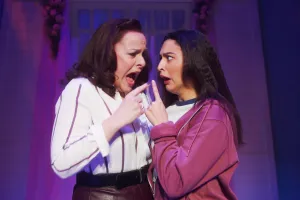Thea Sharrock‘s production of Nicholas Wright’s Mrs Klein opened at the Almeida last week (29 October 2009, previews from 22 October), marking the play’s first major London revival since its premiere at the National Theatre in 1988.
Mrs Klein, which replaces the postponed world premiere of
Samuel Adamson’s
A Quiet Island in the Almeida’s autumn programme (See
News, 14 May 2009), centres on admired but controversial psychoanalyst Melanie Klein, who, despite her expertise, endures a fraught relationship with her own daughter.
Multiple Olivier award-winner Clare Higgins stars in the title role, alongside Zoe Waites as daughter Melitta and Nicola Walker as Paula.
Many overnight and weekend critics made reference to the Almeida’s other recent ‘therapy play’ – Duet for One, which they warmly received back in February, prompting the Guardian‘s Michael Billington to dub the Islington venue “analyst’s corner”. But it seems most of them enjoy being on the couch, as they praised Sharrock’s rare revival and in particular the “brilliance” of Higgins in the title role. A few complained of a sluggish opening and the “elusive” meaning of Wright’s script, but overall the tomatoes were fresh, and Mrs Klein seems to have made a very timely entrance as we enter awards season.
Michael Coveney on Whatsonstage.com (four stars) – “Thea Sharrock’s revival may be a replacement for the Samuel Adamson play that never happened, but it punches its weight and proves that family business among the Jewish psychoanalysts … is not necessarily a slapstick comedy … The opening scene is a bit slow, and there were some nervy passages of play on opening night, but once combat is joined in Tim Hatley’s blood red room of books, portraits and wooden side cabinets, the sparks fly between Clare Higgins as the intimidating guru, Zoe Waites as Melitta and Nicola Walker as her protégé newly arrived from Budapest … All three women act beautifully and I can only offer praise for the period hair pieces, the costumes and even the sound of Ian Dickinson”
Rhoda Koenig in the Independent (three stars) – “Nicholas Wright’s 1988 play, directed by Thea Sharrock, has a fascinating woman at its centre, which is one of its problems. Klein is so much bolder and more complex than Melitta or the only other character, Paula … that their conflict takes on the aspect of a splendid animal baited by mice … The lack of contrast between the characters also muffles excitement, and the evening is further damped down by slow pacing and understated acting … While suffering from the general lack of oomph, Clare Higgins‘ Klein is utterly convincing as a woman of superb confidence, grandly amused at her own intellect, as if it had a separate existence as the precocious child she never had.”
Michael Billington in the Guardian (four stars) – “The Almeida is turning into analyst’s corner … As in much of Pinter, we are watching a study in displacement in which Paula slowly supplants Melitta as daughter, patient and colleague. Like Brecht’s Mother Courage, Mrs Klein also seems to destroy the children she has sought to protect. Even if the ultimate meaning is elusive, Thea Sharrock’s production explores every cranny of a complex text and is vividly acted. Clare Higgins‘ Mrs Klein is an intriguing mix of intellectual pioneer and failed mother who has treated her children with the professional detachment she brings to her patients: it is her realisation of her inadequacies that makes her performance so moving.”
Charles Spencer in the Daily Telegraph (three stars) – “These days, a visit to the Almeida sometimes feels more like a session with a psychiatrist than a trip to a show … As a writer, Wright often gives the illusion that he is a detached figure. On this occasion, however, it is hard to escape the conclusion that he is highly sceptical of psychoanalysis … Nevertheless, for much of its first half Mrs Klein is often grindingly dull, meticulously acted though it is in Thea Sharrock’s production, set in a Rothko-red lounge that is not so much a room as a womb with a view. In the second half, however, during bitter confrontations between mother and daughter, the play fitfully flares into dramatic life. The great Clare Higgins combines a wry, dry wit with deep emotion as Mrs Klein and her healing tears at the end are deeply moving. Zoe Waites brings a corrosive bitterness to the stage as her daughter, and there is strong work from Nicola Walker as the assistant who increasingly seems like a Pinteresque cuckoo in the nest.”
Ian Shuttleworth in the Financial Times (three stars) – “Claire Higgins’ brilliance at portraying torrents of emotion is matched by her astuteness in suppressing them. Her Mrs Klein is all about control, both of herself and of others, until those moments when she loses it … Nicola Walker as Paula grows during the evening from a position of ingenuousness to one of knowledge, analytic adroitness and even a control of her own … Wright’s play is clever, amusing and poignant, sometimes all at once. However, there seems to be a complacent undercurrent to assumptions about the psychoanalytically literate audience … Despite the rise in estimates of the number of us who suffer from mental illness at one time or another, it is still often seen as something of a luxury to be able to afford to have such problems.””
Susannah Clapp in the Observer – “What makes Clare Higgins so strong an actress? Above all, the ability to show herself altering. On the spot. She seems to change the quality of her flesh, and to do so while remaining completely still. Nicholas Wright is the dramatist above all others who enables her to unleash the shocks of character gradually; he creates women in whom surprises are buried deep … There’s everything schematic about this: good versus bad daughter, future versus the past. But it transmits: Zoe Waites is so convincing as the door-slamming, coffee-cup-banging, suddenly melting daughter, and Nicola Walker so vibrantly needy, predatory and intelligent as the cuckoo in the nest.””
Henry Hitchings in the Evening Standard (four stars) – “Clare Higgins’ Klein is a tyrannical figure, controlled yet wilful. Her filing cabinet has separate drawers for the Ego and the Id; she believes in regimenting everything she can, though the play shows that a totally compartmentalised life is impossible … The drama is a psychological power struggle between the three, in which their initially well-defined roles become ambiguous. Wright’s play is a rich one for performers. When Higgins’ Klein throws her wine in Melitta’s face the gesture, which could seem overblown, is satisfyingly outrageous, and it’s typical of a performance that is narcissistically unpleasant yet also is compellingly sympathetic … Nevertheless, Wright’s erudite play contains too much talk. There is an excess of psychoanalytic terminology, including some leaden stuff about ;symbolic urine’ and ‘persecutory delusion’. And while this gets laughs, there’s a persistent sense that Mrs Klein is cerebral rather than wise.”












